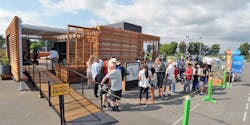Twelve collegiate teams have spent nearly two years designing and building energy-efficient houses for the U.S. Department of Energy Solar Decathlon 2017, which will be held in Denver during the first two weekends in October.
The teams will go head-to-head in 10 contests that evaluate factors including water use, energy efficiency, design cost-effectiveness, innovation, and market potential.
Among the competitors, Team Netherlands has created a modular home inspired by the circular economy, which requires non-compostable products that can be reused. Our H2Ouse, from the University of California, Davis team, has graywater reuse systems, sanitation technology, and monitoring and feedback systems that could cut the water use of a typical residence by half. The Washington University in St. Louis team designed a home constructed of ultra-high-performance concrete that protects against fire, insects, extreme weather, and moisture and mold.
Designed to withstand tornadoes, a steel “Strong Room” below the subfloor with permanent footings is the highlight of the Surviv(AL) house from the University of Alabama at Birmingham, and Calhoun Community College. The team from the University of Nevada, Las Vegas created an age-in-place home that has a nostalgic mid-century modern feel with handicapped-accessible features, radiant floor heating, and mini-split heat pumps, as well as wireless integrated heating, cooling, security, and lighting controls. The Washington State University team designed a community of modular energy-smart small-size houses to fill an urban lot that already has access to infrastructure and utilities.
Six of the contests will be subjectively judged—jury members will provide evaluations based on aesthetics, innovation, and design inspiration. The winners of the remaining four contests will be determined by the effectiveness of their task completion and by monitored performance, such as indoor air temperature and electricity use.
For the first time, winning teams will be awarded cash prizes, with the overall winner taking home $300,000.
